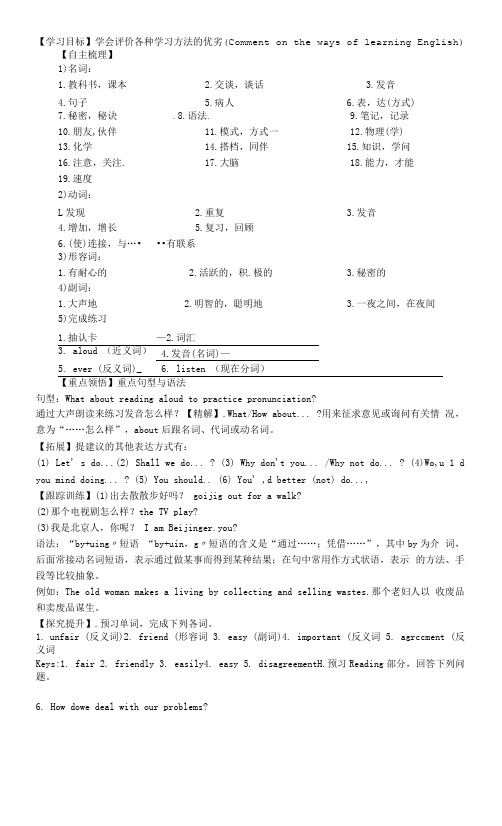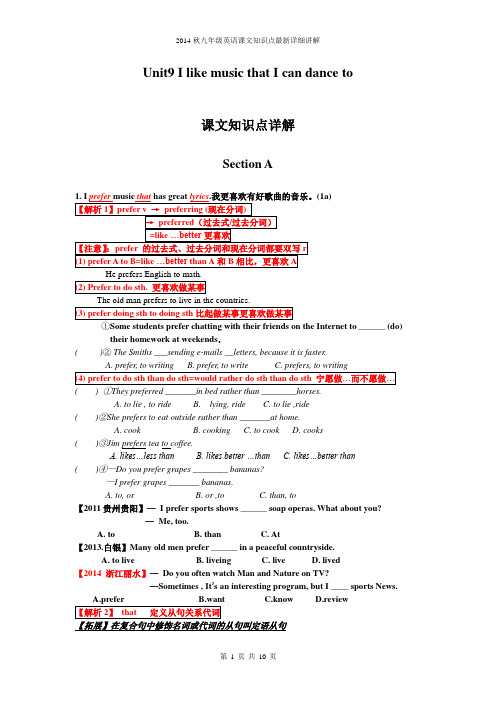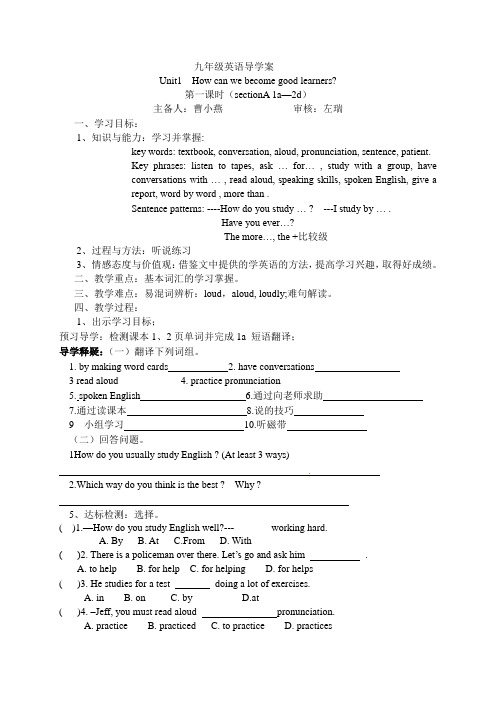九年级英语Unit_9_导学案1学生卷
部编RJ人教版PEP新目标 初三九年级英语 上册第一学期秋季(优质导学案)Unit 9 导学案

(二)句型转换
1. I can sing along with the music. I like it. (合并为一句)
I like the musicI can.
2. Frank likes musicthat’s loud.(对划线部分提问)
正在与李明谈话的老师是谁?(作宾语)
【合作互助学习】.
任务一:
1. What kind of music do you like?
_____________________________________________________.
2. What kind of musicians do you prefer?
九年级英语上导学案
Unit 9 I like music that I can dance to.
课题
Unit 9Period 1 1a-2c
课型
听说课
学习目标
1.知识目标:
1)单词:prefer,lyrics,Australian,electronic
2)词组:prefer to ; dance to ; electronic music; sing along with .
I love music.
2.你更喜欢哪种音乐?
—Whatmusic do you?
我更喜欢我能够随之唱歌的音乐。
Imusic that I can.
3. Rosa喜欢轻柔的音乐。
Rosa likes musicquiet and gentle.
五、课堂小结:
1.我的收获:
2.我的困惑:
课题
Unit9 Period 2
九年级上英语导学案

九年级上英语导学案目录Unit 1 How do you study for a test?(7课时)Unit 2 I used to be afraid of the dark.(7课时)Unit 3 Teenagers should be allowed to choose their own clothes(5课时)Unit4What would you do?(6课时)Unit 5 It must belong to Carla (5课时)Review of units 1-5(2课时)期中复习(2课时)Unit 6 I like music that I can dance to. (5课时)Unit7 Where would you like to visit ?(5课时)Unit8 I’ll help clean up the city parks.(6课时)Unit 9 When was it invented?(5课时)Unit 10 By the time I got outside , the bus had already left .(5课时)Review of Units 6—10 (2课时)期末复习(3课时)Unit 1 How do you study for a test?本单元主要是学习用How 来询问学习方法,通过互相询问讨论,掌握by的用法,同时找到适合自己的学习方法,找出自己在英语学习中的困难。
(共计7时)第1课时Section A 1a-2c【学习目标】1掌握新单词flashcard, vocabulary, aloud, pronunciation2熟练运用how 引起的特殊疑问句及by的用法。
3能够听懂有关学习方法的简短对话。
【学习重难点】1熟记重点单词短语。
2语法:by + 动词ing的用法3句型How do you study for a test? I study by working with a group.【学习过程】一课前预习:(教师寄语:预习感知,有备无患。
九年级英语导学案 Unit 1 How can we become good learners

Unitl How can we become good learners ?,【学习目标】1.通过.交流和表达,进一步掌握学习英语的技巧与方法。
2.1.握下列知识点:单词.教科书,课本4.句子r ,7.秘密,秘诀重点短语:1.,通过制作单词卡片3.练习对话5.练习发音7.注意【自主梳理】预习单词,完成下列各词。
1.抽认卡 3. aloud (近义词)5. ever (反义词)7. study (过去分词)2.交谈,5.病人8.语法谈话3.发音6.表达(方式)9.笔记,记录2.4.6.2.向某人请求帮助4.爱上,喜欢上6.第一次8.犯错误词汇发音(名词)—listen (现在分词)(课本中查找答案)1.,2. 3. 4 5. 6. 7.【重点领悟】① How do you studyfor a test?语法:by+ V-ing的用法【探究提升】I.用所给单词的适当形式填空We studyby (work) with a1.It is a great way(1earn)②What about listening to tapes?3.W hat about (read) aloud n.根据汉语提示完成句子Have youever4.I study English group. a language.(practice) pronunciation and intonation?一(和朋友一起练习对话)friends?(通过制作)flashcards.6. (怎么样)listening to tapes?7.这个问题太难了,我理解不了。
It's hard m,e this question.8.朗读能提高你的口语。
-can your spoken English.Keys: 1. working 2. to learn 3.. Reading , preicticing 4. practiced witch friends5. by making 6. How about 7. too, for, to understand 8. Reading , improve.Unitl How can we become good learners ?【学习目标】学会评价各种学习方法的优劣(Comment on the ways of learning English) 【自主梳理】1)名词:1.教科书,课本2.交谈,谈话3.发音4.句子5.病人6.表,达(方式)7.秘密,秘诀.8.语法.9.笔记,记录10.朋友,伙伴11.模式,方式一12.物理(学)13.化学14.搭档,同伴15.知识,学问16.注意,关注. 17.大脑18.能力,才能19.速度2)动词:L发现 2.重复 3.发音4.增加,增长5.复习,回顾6.(使)连接,与…•••有联系3)形容词:1.有耐心的2.活跃的,积.极的3.秘密的4)副词:1.大声地2.明智的,聪明地3.一夜之间,在夜间5)完成练习1.抽认卡—2.词汇3. aloud (近义词)_4.发音(名词)—5. ever (反义词)_6. listen (现在分词)【重点领悟】重点句型与语法句型:What about reading aloud to practice pronunciation?通过大声朗读来练习发音怎么样?【精解】.What/How about... ?用来征求意见或询问有关情况,意为“……怎么样”,about后跟名词、代词或动名词。
2014秋九年级英语unit9I_like_music_that_I_can_dance_to 课文知识点详解 讲义 导学案

Unit9 I like music that I can dance to课文知识点详解Section A1. I prefer music that has great lyrics.我更喜欢有好歌曲的音乐。
(1a)【解析1】prefer v →preferring (现在分词)→preferred(过去式/过去分词)=like …better更喜欢【注意】:prefer 的过去式、过去分词和现在分词都要双写r(1) prefer A to B=like …better than A和B相比,更喜欢AHe prefers English to math.(2) Prefer to do sth. 更喜欢做某事The old man prefers to live in the countries.(3) prefer doing sth to doing sth比起做某事更喜欢做某事①Some students prefer chatting with their friends on the Internet to ______ (do)their homework at weekends.( )② The Smiths ___sending e-mails __letters, because it is faster.A. prefer, to writingB. prefer, to writeC. prefers, to writing(4) prefer to do sth than do sth=would rather do sth than do sth 宁愿做…而不愿做…( ) ①They preferred _______in bed rather than ________horses.A. to lie , to rideB. lying, rideC. to lie ,ride( )②She prefers to eat outside rather than _______at home.A. cookB. cookingC. to cookD. cooks( )③Jim prefers tea to coffee.A. likes…less thanB. likes better …thanC. likes…better than( )④—Do you prefer grapes ________ bananas?—I prefer grapes _______ bananas.A. to, orB. or ,toC. than, to【2011贵州贵阳】—I prefer sports shows ______ soap operas. What about you?—Me, too.A. toB. thanC. At【2013.白银】Many old men prefer ______ in a peaceful countryside.A. to liveB. liveingC. liveD. lived【2014 浙江丽水】—Do you often watch Man and Nature on TV?—Sometimes , It’s an interesting program, but I ____ sports News.A.preferB.wantC.knowD.review【解析2】that 定义从句关系代词【拓展】在复合句中修饰名词或代词的从句叫定语从句I like music that I can dance to.music 是先行词,that是关系代词He is the man who I met yesterday.man是先行词,who是关系代词结构:人(n.) + who/that + 从句物(n.) + that/which + 从句关系代词who; that;的作用:a. 做代词,代替先行词b. 在从句中担任句子成分:主语或宾语c. 做连词,把主句和从句连接起来who / that/which 在定语从句中做主语时,谓语动词的单复数应与先行词保持一致I prefer shoes that______ cool. (be)I like a pizza that______ really delicious. (be)I love singers who ______ beautiful. (be)I have a friend who _______ sports. (play)【追踪训练】【2014鄂州中考】— Where is the School English Speech Contest going to be held tonight?— I’m not sure. Is it in the hall _____ can hold 300 people?A. whereB. whatC. thatD. when【2014湖北黄冈】— In a text message, 88 means Bye-bye.—And another example is F2F______ stands for face to face.A. thatB. whoC. whomD. it【2014四川内江】33. —The TV play you who came from the stars is popular recently.—Yes,it is only the program ____ I watched this month.A. whoB. thatC. whereD. when【2014甘肃白银】38. Could you tell me the result of the discussion_____ you had made in the morning just now?A.thatB. whenC. howD. Who【解析3】lyrics /liriks/ n. (pl.) 歌词She likes singers who write their own _______ (lyric).2.I love music that I can sing along with。
人教版九年级英语全册导学案

第1课时Unit 1 Section A 1a-2c【Le arning objectives】1 Knowing:flashcard,aloud,pronunciation,skill,voice2 Habit-forming: How do you study for a test? I study by、、、、、、、、、3 Communicating:Talk about how to study freely【Important leaning points】运用by doing 谈论学习方式【Learning process】一、自主学习(教师寄语:相信自己,一定能行!)Task1:Talk about how to study for the test1、完成下列短语与朋友一起学习制作抽认卡瞧课本制作词汇表听磁带向老师寻求帮助2、理解下列对话,并利用上面词组练习:A:How do you study for a test? B:I study by working with a group、A:How does Bob study for a test? B:I study by marking flashcards、3 、听录音,完成1 bTask2: Talk about how to learn English1、小组练习,利用下列句型谈论怎样学习英语、A:How do you learn English? B:I learn by 、、、、、、A:Do you learn by、、、、、、、、、? B:Yes,I do、 /No, I don't、2、理解2a、2b中的句子,找出下列短语:瞧英文光碟与朋友连交际大声读练习发音小组学习说的技能做、、、、、、、、、太难3、听录音,完成2a、2b4、根据听力内容,练习上面对话。
5、读听力材料,理解以下知识点:the best way to learn EnglishWho has an idea?keep a diary in Englishlook up new words in a dicctionary二、Cooperration (教师寄语:学会合作,提高自我)根据听力材料,小组自由讨论如何学好英语?三、Summary根据下面的句子,总结by的用法与含义:1、I have to be in bed by 10 o'clock、2、There is a tree by the river、3、I go to work by bus、4、The boy is sent to the hospital by a kind man、5、You can learn English by working with friends、四、诊断评价(一)补全单词:1、It's a good way to read a2、The boy often l up the words in the dictionary、3、Do you have an i about weekend?4、K a diary helps to write English every day、5、The girl often learn by a the teacher for help、6、What about reading about to practise p?(二)补全短文:A:Tom,I know you (数学学的很好)last term、How do you learn math?B:I learnt it (通过做很多题)A:What else?B: (通过向老师寻求帮助)A:Did you learn ?(通过小组学习) B: Yes, i did、( Lucy也就是)【课后反思】(教师寄语:从不断反思中完善自己,提高自己)第2课时Unit 1 SectionA 3a-4【Learning objectives】1、Knowing: specific, memorize, grammar, differently, frustrate, frusrating, quickly, add ,not at all, excited, end up、2、Understanding:Be able to understand the meaning of the passage in 3a、3、communicating: ---How do you learn English?---I often write vocabulary lists、【Important points】1、Understanding:Be able to understand the meaning of the passage in 3a、2、communicating: ---How do you learn English?---I often write vocabulary lists、【Learning process】一、自主学习Task1学习第4部分短语,谈论自己如何学习英语。
九年级英语导学案Unit 1

九年级英语导学案Unit1 How can we become good learners?第一课时(sectionA 1a—2d)主备人:曹小燕审核:左瑞一、学习目标:1、知识与能力:学习并掌握:key words: textbook, conversation, aloud, pronunciation, sentence, patient.Key phrases: listen to tap es, ask … for… , study with a group, haveconversations with … , read aloud, speaking skills, spoken English, give areport, word by word , more than .Sentence patterns: ----How do you study … ? ---I study by … .Have you ever…?The more…, the +比较级2、过程与方法:听说练习3、情感态度与价值观:借鉴文中提供的学英语的方法,提高学习兴趣,取得好成绩。
二、教学重点:基本词汇的学习掌握。
三、教学难点:易混词辨析:loud,aloud, loudly;难句解读。
四、教学过程:1、出示学习目标;预习导学:检测课本1、2页单词并完成1a 短语翻译;导学释疑:(一)翻译下列词组。
1. by making word cards2. have conversations3 read aloud ________ 4. practice pronunciation ________________5. spoken English6.通过向老师求助7.通过读课本8.说的技巧9 小组学习10.听磁带(二)回答问题。
1How do you usually study English ? (At least 3 ways)2.Which way do you think is the best ? Why ?5、达标检测:选择。
最新人教版九年级英语全一册导学案(全册 共209页)
最新人教版九年级英语全一册导学案(全册共209页)目录Unit 1 How can we become good learners?Unit 2 I think that moon-cakes are delicious!Unit 3 Could you please tell me where the restroom are?Unit 4 I used to be afraid of the darkUnit 5 What are the shirts made of?Unit 6 I like music that I can dance to.Unit 7 Teenagers should be allowed to choose their own clothes.Unit8It must belong to Carla.Unit 9 I like music that I can dance to.Unit10You’re supposed to shake hands.Unit 11 Sad movies make me cry.Unit 12 Life is full of the unexpected.Unit 13 We're trying to save the earth!Unit 14 I remember meeting all of you in Grade 7.Unit 1 How can we become good learners?to be patient4. Try to guess a word’s meaning by reading the sentences before and after it.sentence n.Please use this word to make a sentence. make a sentence 五、练评(包含“考点链接” 应用探究 6分钟) 单项选择。
九年级英语导学案参考答案
九年级英语导学案参考答案Unit 1参考答案第一学时Secton A(3a-_4)一、1.practice pronunciation 2.improve speaking skills 3.the best way of doing/to do 4.memorize new words 5.be excited about 6.end up 7.make/do a survey about 8.listen to tapes 9.read aloud10.be frustrated二、1D 2C 3A 4C 5A 6B 7C 8A三、1.too boring watch 2. excited about 3.to learn by reading 4.very difficult to by watching 5.has been learning for第二学时SectonB (1a_-2c)一、make mistakes in/spoken English /writing practice/get the pronunciation right/ practice speaking English二、1.speaking 2.mistakes 3.challenge 4.solution三、1.didn’t pronounce 2.been singing 3.their solutions 4it frustrating 5. challenges四、1C 2B 3A 4A 5C 6D 7A 8B 9B 10B第三学时Secton B(3a-_4)一、1. it doesn’t matter 2.Don’t laugh at others 3.be afraid of g oing out 4.make complete sentences5.make English notes6.have difficulty using grammar7.be good for8.be a good English learner二、1.decide take lots notes 2.afraid to thought laugh at 3.make up full 4.deal with problems ter on realized it doesn’t mat ter三、understand /too quickly /English-language TV /listening practice /Original sentences四、略。
外研版英语九上试题Module 9导学案
九年级英语上册Module 9导学案Unit 1【课前朗读】borrow, put up, website, mail, textbook, mainly, thousands of, page, electronic, powerful, memory, full, fix, instructions, lend, properly【学习目标】知识与技能:1、掌握一般将来时的被动语态和情态动词的被动语态。
2、能听懂有关发明及其运用的文章。
过程与方法:通过自主互助与合作的方法,借助听力结合话题解决问题。
情感目标:1. 尊重科学,提升生活中的发明。
2. 培养学生独立思考,合作交流的良好习惯。
【学习重、难点】1. 认知一般将来时和情态动词的被动语态。
2. 能听懂有关发明及其运用的对话。
【学习过程】Step1导入新课1. What are the four great inventions of ancient China? Who invented them? We have inventions everywhere. Inventions make us live easily and happily. Without inventions, our lives will be difficult. Now inventions are invented all the time.这时教师拿出新买的数码相机来导入。
让学生发表看法,完成活动1的三个问题。
在这些问题的交谈中很可能用到本课内出现的单词。
所以这些讨论为进入阅读做了很好的准备。
2. 展示新句型 1)They will be put up on the school website.2) And they can be seen on the Internet by other classes.3) Will computers be used more than books in the future?4) That can be fixed.Step2听力处理:1. Listen to the passage for the first time and finish activity2.Step 3对话处理(listening practice)1. Listen for the first time and answer the questions.1) How did Tony’s father hear from his pen friends once?2) How did Tony’s father hear from his pen friends now?3) Where did we get information in the past?4) Where can we get information now?读后听:Listen for the first time and finish Activity 4.2. 听后读(阅读)学生默读对话,进一步理解对话内容,完成Activity 5.Step 4 读后说1.Work in pairs:同桌两两对话,互相问答3个问题。
九年级英语上册全一册导学案(打包54套)(新版)仁爱版
九年级英语上册全⼀册导学案(打包54套)(新版)仁爱版The Changing World教师寄语:A waste of their time is slow suicide, wasting people's time is the murder.( 浪费⾃⼰的时间是慢性⾃杀,浪费别⼈的时间是谋财害命。
)Class________ Grade9 Group_________ Name_____________课型:预习+展⽰课Title: Unit 1 The Changing world (正在变化着的世界)Topic 1:Our country has developed rapidly. (我们的国家发展迅速。
)Section: B 1a-1c (P3) 第⼀课时Learning steps (学习过程):⼀、抽测反馈(Check before class)(5’)(我会做)1.⽤括号内单词的正确形式填空。
1) Great changes ________________(take) place in Rita’s hometown.2)Jane ________________( be) to Mount Huang with her parents.3) Kangkang ________________( be ) to an English summer school to improve hisEnglish.4)There __________(go ) the bell.2.根据汉语意思完成句⼦,每空⼀词。
1)天⽓很糟糕,以⾄于我不想出去。
The weather is ______bad ______I don’t want to go out.2)顺便说⼀句,今晚到我家喝⼀杯怎么样?________ ________ ________ , why not have a drink at my home this evening?3)他去伦敦了。
- 1、下载文档前请自行甄别文档内容的完整性,平台不提供额外的编辑、内容补充、找答案等附加服务。
- 2、"仅部分预览"的文档,不可在线预览部分如存在完整性等问题,可反馈申请退款(可完整预览的文档不适用该条件!)。
- 3、如文档侵犯您的权益,请联系客服反馈,我们会尽快为您处理(人工客服工作时间:9:00-18:30)。
Unit 9 When was it invented?第一课时年级:九年级学案学科:英语课型:New主备人:蔡红梅班级 ________一.学习目标:1.知识目标:1 . Words and phrases 2. Talk about the history of inventions2.能力目标:能在具体语境中正确运用被动语态。
3.情感目标:了解中国古代四大发明,培养爱国主义精神。
二.学习重点:重点词汇用法及被动语态用法。
学习难点:被动语态各种时态的构成。
三.学习过程:(一)预习导学:Talk about the invention time of some things.(二)自主学习:SeactionA1a-1c(三)合作探究:Make a list of five helpful inventions and five annoying inventions.(四)梳理归纳:被动语态1.被动语态的时态: 被动语态的时态通过be的变化来体现,它必须与主语的人称、数一致。
以下是几种常用的被动语态:(1)一般现在时的被动语态: am / is / are + 动词的过去分词。
Eg:This book in two languages.这本书是用两种语言写的. (2)现在进行时的被动语态: am / is /are + being + 动词的过去分词。
Eg: A school is by the workers now.工人们正在建一所学校.(3) 一般将来时的被动语态: will / be going to + be + 动词的过去分词.Eg: The project will next month.这项工程下个月就完工. (4) 现在完成时的被动语态: have / has + been + 动词的过去分词.Eg: My homework .我的作业以完成了.(5) 一般过去时的被动语态: was / were + 动词的过去分词.Eg: The classroom three days ago. 教室是三天前被打扫的.(6) 含有情态动词的被动语态: 情态动词 +be +动词的过去分词.The classroom every day.教室应该每天都被打扫.2.被动语态的否定句和疑问句:(1)否定句的构成:必须在第一个助动词后加not。
Eg:His homework finished. 他的作业还没有完成。
(2)疑问句的构成:将第一个助动词置于主语之前。
Eg:When the bridge ?这座桥是何时建的?3、主动语态变被动语态的方法:(1)把主动语态变的宾语作为被动语态的主语(2)主动语态的谓语改成be + 过去分词的形式,作为被动语态的谓语,be随着主语以及时态的变化而变化。
(3)主动语态的主语变为by的宾语,有时可以省略。
Eg: He often plays computer gamesoften by him4、被动语态的注意方法:(1)在主动句中动词make,let,have,see,hear,feel,watch,find notice等后接不定式作宾补时,动词不定式都要去掉to,但变被动语态时,后面的不定式须加to.make sb. do sth. sb. be made to do sth.eg: The man made the boy do his homework..The boy was made his homework.hear sb. do sth. sb. be heard to do sth.eg: I often hear him sing in the next room.He is often heard in the next room.(2) 主动语态中若有双宾语,变为被动语态时,只将其中一个宾语变为被动句的主语,另一个宾语不变.一般情况下,往往把表示人的宾语变为被动句的主语,而把直接宾语(物)留作被动句的宾语。
如果把主动句的直接宾语变为被动句的主语,则间接宾语常须有介词(一般是for或to)eg: My mother bought me a bike. 其被动句为:I was bought a bike by my mother. = A bike was bought for me by my mother.(3)有些词如系动词taste, feel, look, smell, sound 等,以及 sell 作“销量(好坏)”讲时常用主动语态表达被动的意思.Eg: This song sounds gentle. 这首歌听起来轻柔.Many kinds of books sell well. 许多种类的书销量不错.(4) happen=take place “发生,” belong to “属于,”没有变动语态.Eg: The necklace belongs to me. 这个项链属于我.英语年份的读法:一般先读前两位数,再读后两位数。
例如:1983→nineteen eighty-three1700→seventeen hundred1870→eighteen seventy1601→sixteen a one或sixteen hundred and one965→nine sixty-five 或nine six five像20XX这种就可以念two thousand and ...2008年two thousand and eight2012年two thousand and twelve知识连接:四大发明、什么人发明的、时间造纸术 Papermaking 蔡伦Cai Lun 东汉元兴元年(105) Xing Yuan Han Dynasty (105) 指南针 Compass 我国劳动人民Chinese people 战国时期 Warring States period火药 Gunpowder 我国劳动人民Chinese people 隋代 Sui Dynasty活字印刷术 Typography 毕升 Bi Sheng 北宋庆历间(1041-1048)Song Qingli period (1041-1048)◎discover 作动词,意为“发现”,即发现的对象是本来存在的,只是以前不知道而已,也可指发现新奇或意外之物或发现某种情况。
“发现者”为discoverer。
invent作动词,意为“发明”,发明的对象是以前没有的新东西,如工具、手段或方法。
“发明”作名词用invention,“发明者”为inventor。
【即学即用】用discover和invent填空⑴Paper was in China.⑵Columbus America in 1492.⑶I that she was a good cook.课堂反思第二课时年级:九年级学案学科:英语课型:New主备人: 蔡红梅班级 ________一.学习目标:1.知识目标:1 . Words and phrases 2. Talk about the history of inventions2.能力目标:能在具体语境中正确运用被动语态。
3.情感目标:了解中国古代四大发明,培养爱国主义精神。
二.学习重点:重点词汇用法及被动语态用法。
学习难点:被动语态各种时态的构成。
三.学习过程:(一)预习导学:Talk about the invention time of some things.(二)自主学习:2a --4(三)合作探究:Make a list of five helpful inventions and five annoying inventions.重点词和短语1. = . 用来做某事2. hand-held calculators 。
3. battery-operated slippers 。
4. 在黑暗中5. shoes with adjustable heels 。
shoes with high heels 高跟鞋6. 改变鞋子的式样【即学即用】the following pictures, please write a composition.A. Thanks toB. Because ofC. According toD. Instead of1. They’re used for seeing in the dark. 它们被用于在黑夜里观看。
(Section A, 2b)be used for表示“被用来做……”,介词for表示目的和用途,后面接名词或动词-ing 形式。
相当于be used to do sth.。
如:Wood can be used for making paper.木材可以被用来造纸。
知识拓展含有be used的常用短语:◎be used as表示“被用作……”,介词as意思是“作为”的意思,其后一般接名词,强调使用的工具及手段。
This book can be used as a textbook.这本书可以当作教科书来用。
This piece of wood is used as a bench.把这块木头用作凳子。
◎be used by表示“被……使用”,by后接动作的执行者。
This kind of machine is used by farmers for getting in crops.农民们用这种机器来收割庄稼。
【即学即用】⑴The stones they carried were used houses and bridges.A. to buildB. for buildingC. to be builtD. A and B⑵The room as a meeting room.A. used to being usedB. was used to be usedC. was used to being usedD. used to be used2. I think the most helpful invention is the light bulb. 我认为最有用的发明是灯泡。
(Section A, 3b)helpful是由名词help加上-ful后缀构成的形容词,意为“有帮助的”,类似的形容词还有:thank—thankful(感谢的,感激的) grate—grateful(感谢的,感激的)use—useful(有用的) wonder—wonderful(令人惊奇的)forget—forgetful(健忘的) success—successful(成功的)beauty—beautiful(美丽的) pain—painful(疼痛的)3. Potato chips were invented by mistake. 薯条的发明纯属歪打正着。
